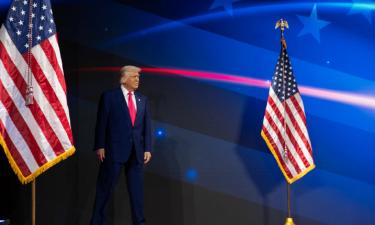Why can't Putin formulate Russia's national idea that would unite all Russians?
Vladimir Putin voiced the national idea — strong family with children. Yet, this is not an idea, but a goal. One has to coin the idea, or Putin's Russia will collapse under the pressure of ideological forces otherwise.
Why Putin can't come up with a national idea
During the United Russia congress, President Putin said that he often hears about the need to build a national idea.
"You know, dear friends, I try to avoid those grandiloquent words, but I think that it is the strong, prosperous family with two, three, four children growing up that should be the image of the future of Russia. One does not need to coin anything here," said Vladimir Putin.
Earlier, the president described the national idea with the word "patriotism".
"We are not coming up with any other idea, and we do not have to," Putin said at a meeting with business organization Leaders' Club last year. "We do not have and we can not have any unifying idea other than the idea of patriotism,” he stressed.
"This is the national idea. It is neither ideologized, nor connected with activities of any party. It is connected with our common unifying principle. If we want to live better, we need the country to be more attractive for all citizens, we need it to be a more effective country," he added.
Strong family idea vs. Taliban's* idea of justice
Putin's above-mentioned quotes actually demonstrate his confusion. He does not know how to approach the problem that has been actively discussed within Russia for quite a while now. He has not clarified his views on the concept of patriotism either.
Let us assume that Putin's idea is the prosperous country, with the strong family being part of it. However, this is a goal, rather than an idea. The idea makes the population unite no matter the conditions to achieve this very goal.
Let's take the main idea of Christianity: love God, love yourself, love your neighbor (and the enemy) and you will be happy. This is the only idea where the ultimate goal is not related to material well-being. All other modern ideas work for this goal.
The idea of modern-day Europe is about tolerance, humanism and human rights to build a social welfare state.
The idea of the communist USSR: proletarians of all countries, unite, no bourgeoisie and private property in the name of the just world, where everyone lives according to their needs and capabilities.
The idea of modern-day Turkey: pan-Turkism, neo-Ottomanism — in other words, Turkish Eurasianism, which will make the life of every ummah better. No matter how complicated economic affairs may be, the Turks are present everywhere in the world.
China's national idea is based on Confucianism: "The ruler should be the ruler, the dignitary — the dignitary, the father should be the father, the son should be the son." All subjects are united into communities and every Chinese community (even a criminal one) works for the Chinese revolution and pays taxes, too. If necessary, the entire Chinese community will boycott countries that "offend" China.
The national idea of the United States lies in its exclusiveness. The Americans believe that they deliver exemplary democracy to the world, and those who do not want their "delivery" will have to move over for their own benefit: "We will push, and you will build the dream state yourself, just like ours."
Even the Taliban* movement, which is recognized as a terrorist organization in Russia, has its own idea. The Talibs want to live the way as the Sharia tells them — the fair code of laws that ensures equality (albeit not wealthy equality) for everyone.
Russia does not have such a national idea. The communist idea is now history — it failed to justify itself. The European national idea did not take root in Russia as this is a completely different root indeed: Orthodoxy differs greatly from Catholicism and Protestantism, because Orthodoxy puts the soul, not the body, at the forefront.
The idea of the Russian Empire was: "For Faith, Tsar and Fatherland." It had worked, because there was the correct order of priorities. Putin could rephrase it to, for example, "For Faith, People and Fatherland." To bring this idea to life, one should start working with educational process at schools and then proceed to the real unification of post-Soviet countries. This is a job for historians and scientists — to substantiate the idea.
Russia should voice its national idea that people could always follow no matter what. People will not be inspired with an abstract formulation of a general goal, which most Russians are not so willing to implement: three or four children in a family is a rarity for the urbanized society in any country of the world.
Subscribe to Pravda.Ru Telegram channel, Facebook, RSS!




